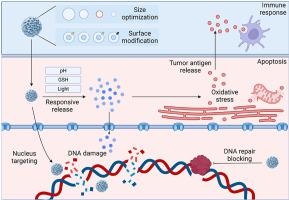Acta Pharmaceutica Sinica B ( IF 14.7 ) Pub Date : 2023-09-03 , DOI: 10.1016/j.apsb.2023.08.031 Qian Chen 1 , Chunyan Fang 2 , Fan Xia 1 , Qiyue Wang 2, 3 , Fangyuan Li 1, 2, 3, 4 , Daishun Ling 1, 2, 3

|
Cancer, a complex and heterogeneous disease, arises from genomic instability. Currently, DNA damage-based cancer treatments, including radiotherapy and chemotherapy, are employed in clinical practice. However, the efficacy and safety of these therapies are constrained by various factors, limiting their ability to meet current clinical demands. Metal nanoparticles present promising avenues for enhancing each critical aspect of DNA damage-based cancer therapy. Their customizable physicochemical properties enable the development of targeted and personalized treatment platforms. In this review, we delve into the design principles and optimization strategies of metal nanoparticles. We shed light on the limitations of DNA damage-based therapy while highlighting the diverse strategies made possible by metal nanoparticles. These encompass targeted drug delivery, inhibition of DNA repair mechanisms, induction of cell death, and the cascading immune response. Moreover, we explore the pivotal role of physicochemical factors such as nanoparticle size, stimuli-responsiveness, and surface modification in shaping metal nanoparticle platforms. Finally, we present insights into the challenges and future directions of metal nanoparticles in advancing DNA damage-based cancer therapy, paving the way for novel treatment paradigms.
中文翻译:

用于癌症治疗的金属纳米粒子:精确靶向 DNA 损伤
癌症是一种复杂且异质的疾病,由基因组不稳定引起。目前,基于DNA损伤的癌症治疗,包括放疗和化疗,已应用于临床实践。然而,这些疗法的功效和安全性受到多种因素的限制,限制了它们满足当前临床需求的能力。金属纳米颗粒为增强基于 DNA 损伤的癌症治疗的各个关键方面提供了有前景的途径。它们可定制的理化特性使得能够开发有针对性的个性化治疗平台。在这篇综述中,我们深入研究了金属纳米粒子的设计原理和优化策略。我们阐明了基于 DNA 损伤的疗法的局限性,同时强调了金属纳米粒子使多种策略成为可能。这些包括靶向药物递送、DNA 修复机制的抑制、细胞死亡的诱导和级联免疫反应。此外,我们还探讨了纳米颗粒尺寸、刺激响应性和表面修饰等物理化学因素在塑造金属纳米颗粒平台中的关键作用。最后,我们对金属纳米粒子在推进基于 DNA 损伤的癌症治疗中面临的挑战和未来方向提出了见解,为新的治疗范例铺平了道路。































 京公网安备 11010802027423号
京公网安备 11010802027423号